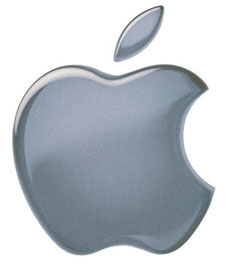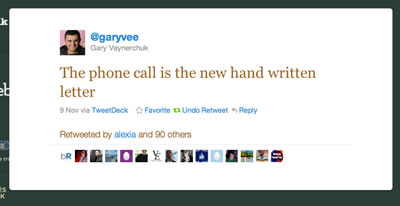An Apple for the Living Room
 Monday, May 9, 2011 at 4:42PM
Monday, May 9, 2011 at 4:42PM 
Ten years ago it seemed unlikely that Apple would successfully make the transition from computer company to one of the worlds largest consumer electronic and media companies.
That today the value of its brand has eclipsed both Microsoft and Google whilst deriving most of its revenue from the sale of mobile devices and digital content stands testament to its vision and ability to cause and ride the disruptions that are alluding many. That this news coincidentally comes within a week or so of Sony’s nightmare scenario for the PlayStation Network has encouraged me to think about how far Apple could go.
The iPad 2 was never going to be as revolutionary as the iPad 1 after all the first iPad wasn’t just a new product, it was a whole new category of computer. “Magical” or not I’m pretty sure that Apple on the first outing ultimately had to take a deep breath and hope that consumers and developers figured out what the iPad was on their own.
It was an audacious gambit where had Apple positioned iPad as an ebook reader it would have been slammed for being more than twice the price of a Kindle or as a notebook replacement people would have undoubtedly pointed to the raft of cheap netbooks on the market. Indeed some did anyway and we’re about to see the appearance of “netbook 2.0” running Chrome OS for the keyboard Jesuit’s. Good luck with that.
15 million iPads later suggests that the world got the point.
But I actually wonder whether the iPad is really a “third computing category” between the smartphone and the laptop or whether it and products like it will effectively replace both whilst making a convincing play for the family living room.
It’s the latter bit, the living room, that I believe may drive sales of iPads and comparable tablet devices into the hearts and homes of the less gadgety or affluent. I’ll come back to that in a moment.
Does the iPad 2 or future versions thereof prove my oft-quoted canard that “laptops are on deathrow”?
Well given that it launched with laptop-grade video editing and music composition apps, i.e. the kind of creative tasks that mobile devices had hitherto been incapable of doing, I’m inclined to believe that the days of lugging around a laptop are indeed numbered.
But surely the iPad doesn’t challenge the smartphone?
Well I think the answer to this and to some extent the earlier question maybe related to the age of the user and the way in which we end up embedding devices like the iPad into our everyday lives. The phone call is all but dead which in the tech industry means it’s in serious decline. Looking at my recent usage statement from my mobile telco I’m inclined to believe this.
The phone call is all but dead which in the tech industry means it’s in serious decline. Looking at my recent usage statement from my mobile telco I’m inclined to believe this.
Despite being addicted to checking my smartphone and staying in constant contact with so many friends, family and colleagues I used less than 10% of my monthly allowance of phone calls and SMS. I got hammered on international and data-roaming but that’s another issue.
The fact is that I use my smartphone mostly for apps, browsing and email whilst for actual speaking I tend to use the significantly cheaper Skype for international.
The phone call is becoming as anachronistic as the keyboard. Phone calls are invasive, they come at the most inconvenient times demanding you to interrupt whatever you’re thinking about, working on or enjoying. Phone calls are low bandwidth information carriers that force you to think or respond in real time and whilst it’s nice to hear from a loved one the etiquette of the phone call is hard to sustain in these days of information overload.
Optional musical interlude:
Of course, there are times when only a phone call or a physical meeting will do. Heaven knows how many people I’ve upset with a carelessly written email or poorly constructed tweet. But those calls are getting further apart and can easily be conducted via Skype that also allows me to share other information during a call. Recent stats from Nielsen shows that voice usage of phones has been dropping in every age group except for those past age 54 where teens see SMS as easier and faster than a phone call whilst still fun.
Recent stats from Nielsen shows that voice usage of phones has been dropping in every age group except for those past age 54 where teens see SMS as easier and faster than a phone call whilst still fun.
This behavior is important if one considers that it takes most industries at least a generation to be completely disrupted so the mighty telco’s time could soon be up.
So assuming that I’ve ditched my laptop would I also be prepared to ditch my smartphone?
This is a tricky one given that the form factor of the pocketable digital communicator is its biggest strength but I’m increasingly performing similar tasks on both my smartphone and my iPad although this is often down to habit rather than necessity. I often take Skype calls on my iPad using a bluetooth headset.
Taking the Nielsen stats into account I wonder if younger people will form the same habits or whether they’ll settle for a single device?
I’m not ready to consign the smartphone to “deathrow” status but I do think there is some justification to believe that iPad and tablet computing devices may fragment or challenge the dominance of smartphones at some point in the not to distant future.
So back to my earlier teaser about the living room and the less affluent for whom, in theory at least, premium devices like the iPad might be regarded as an expensive luxury.
So here’s my thinking.
The seemingly obvious upgrade that appeared with iPad 2, that of screen mirroring to HDTV, would appear to give Apple access to a new market and challenge the traditional gaming console / set-top box industry. Surely it’s only a matter of time before this feature becomes wireless and multi-user?
The appearance of HD resolution video games on the iPad that work on your HDTV whilst using the iPad as a sophisticated controller represents an unexpected challenge to the likes of Sony, Nintendo and Xbox.
The iOS App ecosystem has presented a new opportunity for game developers who have taken to the format with zeal and where new champions have emerged such as Rovio, the creators of Angry Birds, who were recently valued at $200 Million and are expecting to head for an IPO in the next few years. The emergence of high quality and often inexpensive games on mobile and social media platforms has wrecked havoc with the traditional video game industry that traditionally relied on cross-subsidy marketing where the console price was subsidised by the cost of the games. The iPad also offers many of the features of the cheaper, smaller but also iOS powered Apple TV system on sale at $99 where via iTunes it offers all the facilities of a video rental and music store as well as a simple way of displaying all of your photo’s, family movies and favourite YouTube clips on the domestic TV to share with the whole family.
The iPad also offers many of the features of the cheaper, smaller but also iOS powered Apple TV system on sale at $99 where via iTunes it offers all the facilities of a video rental and music store as well as a simple way of displaying all of your photo’s, family movies and favourite YouTube clips on the domestic TV to share with the whole family.
Assuming that Apple doesn’t come up with an Apple TV upgrade allowing access to the AppStore with new gaming controllers (what is that micro-USB port really for?) then the iPad could be a viable living room device that also challenges the traditional set-top box provided by your satellite or cable TV provider.
It’s this possible disruption to the satellite TV, video rental and gaming console sectors that interests me.
The story of satellite and cable TV in the UK is well known. In the late 80’s when subscription based satellite TV was about to make it’s debut with the British consumer it was thought that the cost of subscription would mean that it would be a middle-class phenomenon.
Thus one of contenders for the crown, British Satellite Broadcasting, entered the market with a technically superior system that was full of high-brow arts and current affairs programming. Meanwhile Rupert Murdoch took a different route to the market believing that it would be popular entertainment and sport that would drive demand for his Sky service. Well it turned out that Murdoch was right and for a while Britain’s middle class turned their nose up to satellite TV and the “chimney woks” that started appearing on the homes and tower blocks of the great unwashed.
The UK leads the world proportionally for HDTV ownership running at nearly 60% (compared to US at 57%) yet availability to HDTV content is dwarfed by other nations. Only 13% of UK HD-ready households have access to high-definition broadcast channels via their set-top boxes with the majority accessing HD material via Blu-ray or their PlayStation 3 or Xbox 360. So I would suggest that there is a now a new battlefront for Apple and one that could inadvertently benefit those learners from less affluent homes. Despite being a premium product the iPad and similar platforms could be seen as a viable option as a component of a home entertainment system.
So I would suggest that there is a now a new battlefront for Apple and one that could inadvertently benefit those learners from less affluent homes. Despite being a premium product the iPad and similar platforms could be seen as a viable option as a component of a home entertainment system.
Certainly it is clear that that both iOS and Android have intentions on the living room whether it’s via Apple TV or Google TV and this could be the Trojan Horse that finally integrates the web, apps and the wealth of the internet to every home.
If popular entertainment was what drove the uptake of satellite and cable TV in the UK perhaps a device that performs all of the above plus the benefits of access to knowledge and learning may find itself into the hands of the many.
Granted I’ve taken quite a leap with my “what-if’s” but 10 years ago few imagined that Apple would become the largest retailer of music to the consumer. Based on that performance would becoming the dominant provider of entertainment to the living room really be such a stretch?
Now, my thoughts on the iPad 2's (or 3's) possible assault the living room are wild speculation. A developer called FireCore has already demonstrated that it is possible to use Apple TV as a web-surfing device as well as install Apps.
Rather than milk the iPad Apple could decide to officially open their TV system up for web-browsing and App's on HDTV and literally change the game overnight by becoming the cheapest HD gaming system on the market with a potential raft of inexpensive Apps.
In addition to the revenue generated by providing family entertainment such a device could provide access to a whole new audience who want to learn as much as play.
 Graham |
Graham |  Post a Comment |
Post a Comment |  consumer,
consumer,  disruption,
disruption,  entertainment,
entertainment,  gaming,
gaming,  ipad 2 in
ipad 2 in  Business,
Business,  Mobile,
Mobile,  Technology,
Technology,  disruption,
disruption,  video games
video games 


